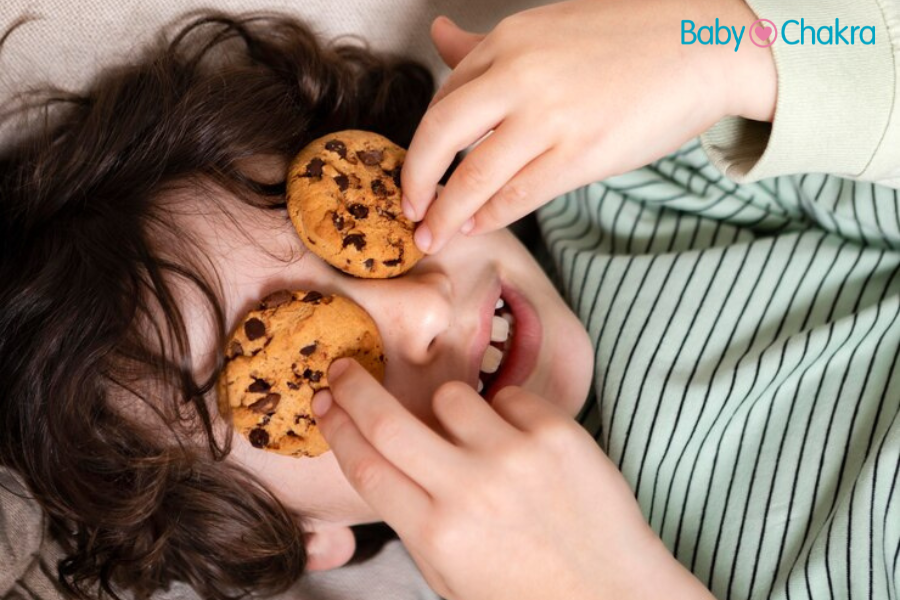
What To Do If Your Kid Is Constantly Hungry?
29 Jun 2022 | 4 min Read
Sayani Basu
Author | 607 Articles
Around the preschool years, kids often start to use the word “hungry” to express other feelings such as boredom, loneliness, sadness, or other emotions they don’t understand or can’t name. According to research, using food to relieve sadness establishes the connection between food and feelings other than hunger and it is common in kids.
If your child complains of hunger frequently, it is advisable to take a minute to gently ask questions to see what’s really going on.
If your toddler quickly forgets about a snack, it becomes clear that they were in search of your attention or just looking for something to do. If the hunger complaints continue, you probably have a hungry kid on your hands and that’s fine. There are a few common culprits behind your kid’s hunger pangs. Read on to know more.
4 Top Reasons For Your Kid’s Hunger Pangs
There are some reasons behind your kid’s hunger pangs. Some of these are:
- Their meals and snacks aren’t filling: Be it the fish-shaped crackers, gummy fruit snacks, and sugary granola bars that are filled with calories. But these snacking items aren’t particularly satisfying and even right after eating them, your child might still be hungry.
Kids who don’t eat fruits and vegetables, which are full of hunger-busting fibre and fluid, might also find themselves hungry at frequent intervals. Plus you can make interesting recipes out of these nutritious foods.
What to do? – It is advisable to make sure that your kid’s meals include filling foods like fibre-rich whole grains, protein, and fruits and vegetables.
It’s fine to have empty-calorie foods like pretzels or white crackers sometimes. But the majority of snacks should be more like “meal foods” that contain filling nutrients.
- Your kid is having a growth spurt: Kids’ appetites tend to fluctuate frequently. Toddlers and preschoolers eat very little one day and loads of food the next.
When children are hitting a growth spurt, there can be a sudden growth in appetite that might seem out of character and even hard to satisfy! Trust us, it’s completely normal.
What to do? – Mums, you can handle those surges in appetite with nourishing and satisfying food. Stock your kitchen with healthy, easy options like nut butter, cheese, edamame, avocado, and whole grains.
- Your child is eating out of boredom: There might be cases when your child can feel hungry out of boredom or because the little one feels worried, nervous, or even excited.
Emotional eating isn’t just for grown-ups, it is the same even for children. Sometimes for a kid, “I’m hungry” means “I’m bored, upset, or just want to eat.”
What to do? – You can try talking with your child about hunger, fullness, and the importance of listening to our tummy. This hunger scale might be helpful to use to help your child rate his/ her hunger.
Scheduled meals and snacks can be a good idea.
If it turns out that your kid is actually not very hungry, you can talk with him/ her and try to comfort the little one.
- The little one is thirsty: Thirst can be mistaken for hunger and kids might get so caught up in playing that they forget to keep drinking, especially during the hot and sultry summer.
What to do? – Refill your child’s water bottle and make sure he/she stays well hydrated. Set a timer for them to remind them to drink water and make it more fun. If they’re truly hungry, you can serve them a healthy snack. But it’s always smart to check in about thirst too.
While these are some of the main reasons why your child may be constantly hungry, there are a few medical conditions that can cause your kid to overeat. Some children can suffer from malabsorption syndrome, a number of disorders in which the intestine can’t adequately absorb certain nutrients into the bloodstream. It can impede the absorption of macronutrients (proteins, carbohydrates, and fats), micronutrients (vitamins and minerals), or both.
Overeating can also be due to a rare genetic disorder called Prader-Willi Syndrome. Therefore, it is advisable to consult a doctor without any delay.
DISCLAIMER: We have taken steps to check the accuracy of the information & practices shared above; however, it is not a replacement for a doctor’s opinion. Please check with either your doctor, or an expert, before trying any suggestion, practice, or medication mentioned here.
A


Related Topics for you
Suggestions offered by doctors on BabyChakra are of advisory nature i.e., for educational and informational purposes only. Content posted on, created for, or compiled by BabyChakra is not intended or designed to replace your doctor's independent judgment about any symptom, condition, or the appropriateness or risks of a procedure or treatment for a given person.
